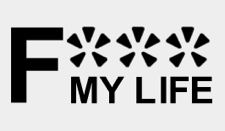 FMyLife’s developer community has a new reason to visit the site this week: to complain about the restrictions the company has recently started to enforce on its API. From now on, FMyLife requires all applications that feature advertising or that have a price tag (e.g. on the App Store) to send 50% of their revenues back to FMyLife. Apps that are available for free, sans advertising, will be able to operate as usual.
FMyLife’s developer community has a new reason to visit the site this week: to complain about the restrictions the company has recently started to enforce on its API. From now on, FMyLife requires all applications that feature advertising or that have a price tag (e.g. on the App Store) to send 50% of their revenues back to FMyLife. Apps that are available for free, sans advertising, will be able to operate as usual.
For those who haven’t been introduced to the FMyLife phenomenon, the site invites users to leave brief personal stories that generally end in catastrophe or extreme embarrassment. All of the stories conclude with “FML” (or F*** My Life), which has become a catchphrase outside of the site as well. It’s a great Schadenfreude fix, and you may even wind up feeling some empathy for your peers (or not). The site, and the third party applications it has spawned, have proven to be extremely popular.
Now, FMyLife disallowed paid applications and advertising when its API launched in February 2009, but the company has been inconsistent about enforcing those rules. Some developers have offered their applications with advertising for some time. And FMyLife has even approved the use of advertising and premium versions in some cases, without anticipating just how popular these applications could become. As it turns out, some of these applications have turned into big businesses in their own right, and some have proven to be drains on FMyLife’s servers. Rather than kill off all applications that are monetizing the service, FMyLife has decided it wants a cut.
Here’s how FMyLife co-founder Didier Guedj is describing the changes to the policy:
The Fmylife API was created to spread FML stories on the internet for free, in the spirit of sharing. However, in recent months, several developers made a very big business by selling FML’s applications or by advertising on it. This has led us to change our policy:
1) Access to the Fmylife API remains free for those using it for non-business purposes.
2) We will now ask that those who are using Fmylife for profit share their revenue at a fair 50/50.
The recently policy changes are directly related to a conflict FMyLife has had with Enormego, a developer that built two applications for the iPhone: “F MyLife and” “F MyLife Pro”, (the free version was briefly ranked as the top application on the App Store) . Here’s how Guedj describes the situation:
Enormego created two applications for iPhones (“F-MyLife” et “F-MyLife Pro”) which generate consequential revenue (through the sale of the apps, plus advertising) because they got more than a million hits per day since April 2009. These two iPhone applications only work thanks to our website, its concept and content. It was agreed with Enormego on July that any revenue generated by these apps would be split 50/50 (no contract was drawn, just via an email exchange). Enormego has never paid to Fmylife any money, and has not replied to any of our Emails since September. After several warnings without any answers, we decided to cut off their access to the API function. Since, they have been pirating the content of our website to feed their applications. We then asked them to stop. They did, only a few days ago.
We’ve reached out to Enormego for their side of the story.
FMyLife’s motivations for implementing a more restrictive API are obvious: they want to make money off the site they’ve built. At the same time, the FMyLife service has certainly benefited from the efforts of these third party developers — you can be sure plenty of people who downloaded these mobile apps are also frequent visitors of the service’s homepage. FMyLife can do what they want with their data, but it’s clear that they should have been consistently enforcing their policies from the start. Some applications have already been discontinued (or removed FMyLife support) since the change.
All of that said, it does sound like FMyLife would be willing to work something out if a developer has already built an application using the API and objects strongly to the changes. From Guedj:
For new applications (premium or ads), we explain the new rule to their developer and they have the choice to share the future income, or they don’t have access to the API.
We’ve never disabled an application (except Enormego’s) because these developers work hard too, and we respect their work a lot. We talk with them, explain the situation and all of them have agreed easily (for now) with our new conditions.

Image via sjdvda on userlogos.